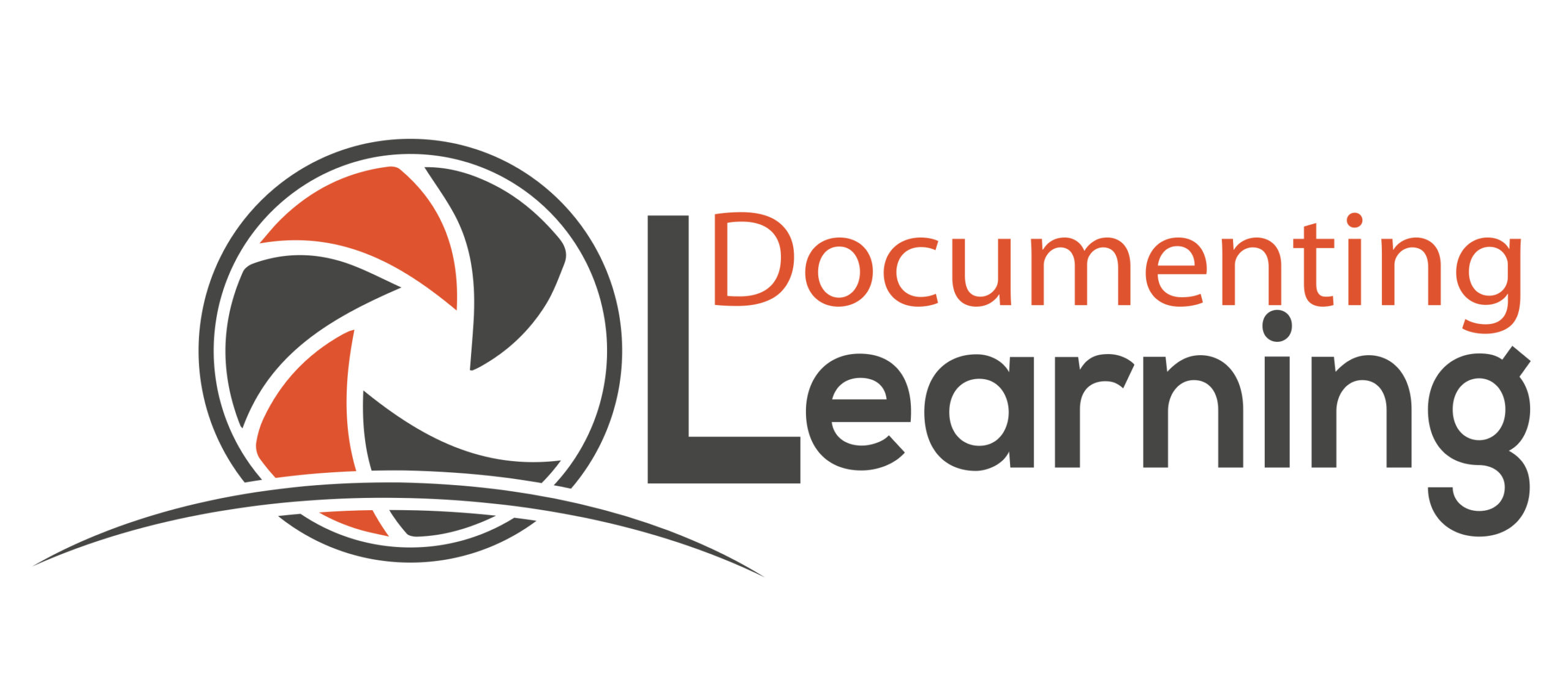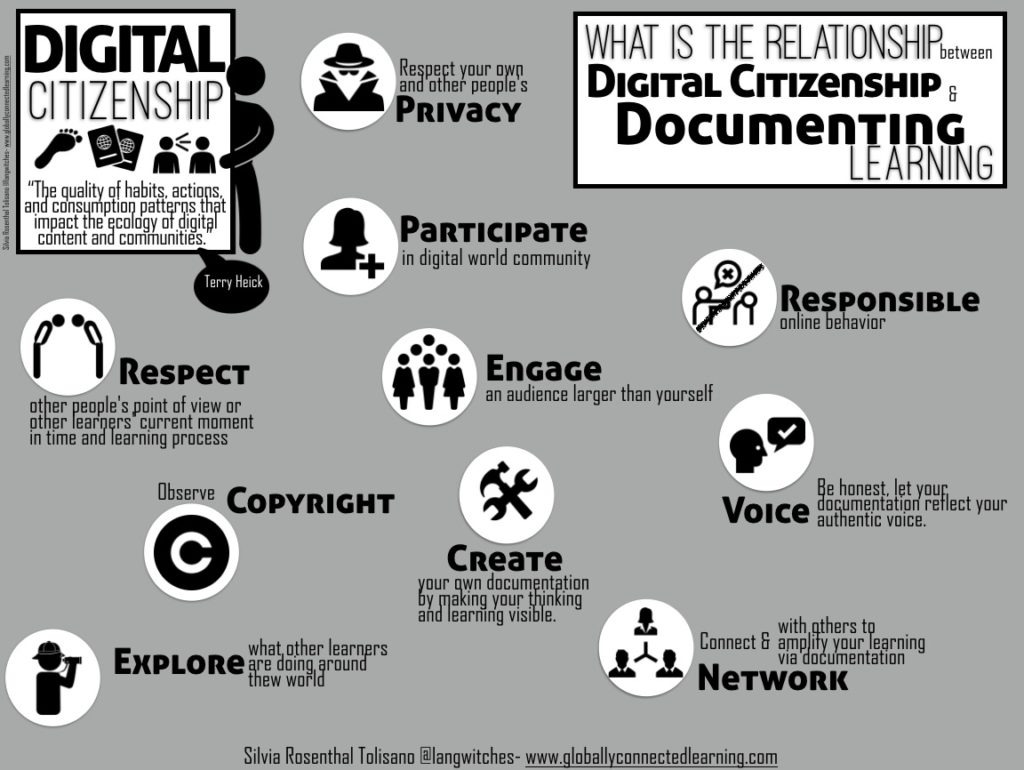This is the third post in a series to dig deeper into the relationship between literacy and documenting learning. HOW does documenting learning have an effects on awareness, skills and developing habits around the so called 21st century “Now” literacies.
- Basic Literacy and Documenting Learning
- Media Literacy / Visual Literacy and Documenting Learning
- Digital Citizenship and Documenting Learning
- Global Literacy and Documenting Learning
- Information Literacy and Documenting Learning
- Network Literacy and Documenting Learning
Terry Heick describes Digital Citizenship as “The quality of habits, actions and consumption patterns that impact the ecology of digital content and communities” and Mia MacMeeking gives us concrete examples of how we can become respectful, valuable and contributing citizens of our digital world.
The following are digital citizenship considerations as they apply to documenting learning. 
Privacy– Respect your own and other people’s privacy
Maintaining our own privacy becomes a strategic decision when we document our learning. What is appropriate to share with the world? Where is the line of documenting personal or professional learning? Should a line between these two types of learning even exist? When we document, do we give away too much our our personal information (identifying details and data such as location, names, friends, interests, buying habits, etc.) that could be exploited by others? When we document, we are not only aware of our own privacy, but need to be aware of and respect other people’s right to their privacy. When we record video, many times it is not necessary to show faces of students or other people, recording their backs and focusing in on WHAT is being done might serve the same purpose of documenting than including recognizable features of the person doing the action. When we do capture other people’s identity it is important to ask permission before taking images or recording video. In schools’, it is important to get permission from parents to be able to capture and share media with their children’s likeliness.
Responsible online behavior
When one documents a moment in time or the process of other learners, it is imperative to not disrespect, expose them to ridicule or let them be seen in a bad light in any way. Documenting learning is about raising awareness of the learning process, metacognition and visible road markers and signs to continue learning. Documenting learning of others is not about shaming their efforts, mistakes and progress by making them public on a digital platform. There is a line not to be crossed, when deciding what can be shared to accurately and strategically represent the learning process to include the non linear, often messy filled with dead ends and mistakes of this process without embarrassing the learner.
Participate in our digital world community.
The digital world has bridged the gap between consumers and producers. While in an analog world it was difficult and expensive to join the ranks of publishers and creators, our digital world has made it accessible to anyone with an Internet enabled device and a connection. Documenting learning amplifies the notion we had for being teachers and for how, where and when we learn. We can can learn how to “dubstep” by a pre-teen, or let a 5 year old teach your own children on the other side of the world how to tie their shoelaces. Contributing quality work to a global learning community is about becoming a valued citizen of a digital world.
Engage an audience larger than yourself
Engaging with an audience ranges from what we document, how we document and how we interact with others who read, view or listen to our documentation and leave feedback. When we document our learning and share via social media, we open ourselves up for feedback. This feedback can range from an active conversation via comments or a more passive form of receiving “likes” or “re-tweets”. Sharing with a larger audience than ourselves influences automatically the way we document in order to make our learning visible and engage our audience.
Voice– Be honest, let your documentation reflect your authentic voice.
Who are you as an observer? Who are you as a learner? Who are you as an interpreter of learning? When you document learning over time, you will develop your own style of documentation, recognizable by others. Use your voice to move the process of learning forward.
Create your own documentation by making your thinking and learning visible.
Documentation is not only curating and displaying other people’s work, but also your interpretation of their meaning. Use text, audio, images, video and any combination thereof to create evidence of learning. Our digital world requires not only consumers, but producers and contributors to make it work. If no one stepped up to create and all of us would want to be “just” consumers, there would be nothing created to be “consumed”. Creating quality work that is being shared to feed the mechanism of the digital world is part of being a digital citizen.
Respect other people’s point of view or other learners’ current moment in time and learning process
When we document learning, sometimes we need to be objective and document, even when it contradicts our own way of viewing the world or our understanding. We need to respect each learner’s prerogative to their individual learning progress, process and achievements.
Observe Copyright– Always give credit to the original author and their intellectual property or their media.
When we document our learning, we often build on resources, ideas and work of others. To document these and show our learning path, we need to reference the original owners and provide reference to the location.
Connect and network with others to amplify your learning via documentation
Documenting learning, up until now mostly described traditionally by Reggio Emilia inspired Pedagogical Documentation, adds a completely new layer when learners have a digital network with whom to share their documentation of learning. New opportunities open up to connect, learn with and from people around the world . Being able to strategically share and disseminate your documentation of learning beyond on-campus colleagues, parents and local school community requires networking skills on a variety of digital platforms.
Explore what other learners are doing around the world
As Terry Heick suggested in his definition of digital citizenship, it is about an ecology of digital content and communities. An ecology is about relations of organisms to one another and to their physical surroundings. There is a need to explore about other learners beyond the limits of our own zip codes. We also need to step up and open up to be the ones being explored by others. Physical exploration is not cost nor time effective. Documentation of our “local learning organism” allows others to explore us virtually and asynchronously.














